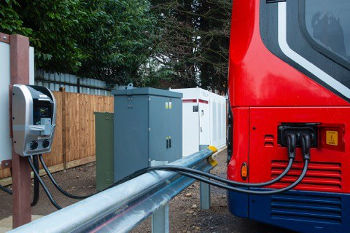Over the past few months, the UK has seen a huge push from the public, both young and old, for decisive action on climate change. Last week, the Committee on Climate Change (CCC) recommended the UK become carbon neutral by 2050.
To meet the target, and our broader legal commitments, both government bodies and private companies must act now to transition towards a smart, low carbon, decentralised energy system. As transport now accounts for around a third of carbon dioxide emissions, investment in new technologies and initiatives, including the electrification of public transport, is critical.
The CCC has stressed that in order to meet carbon reduction targets, grid capacity and flexibility should be significantly increased and policy and regulatory frameworks must encourage innovation, such as demand response and storage.

Surrey's news buses charging
Surrey goes electric
An example of this kind of innovation is the roll-out of the first battery and charging infrastructure for a new electric bus fleet in Guildford in January of this year, implemented by Zenobe Energy, in conjunction with Stagecoach, Guildford Borough Council and Surrey County Council.
Rather than waiting for a hugely expensive, disruptive and time consuming grid upgrade, Stagecoach turned to Zenobe for an alternative. The service provided by this scheme uses proprietary software combined with battery storage to support the constrained local power grid and ensure there is sufficient power available to charge the buses when required.
The battery charges up during the day from the current grid connection and provides power from both the battery and the grid to buses at night, so they are ready to go in the morning for the users of Guildford’s Park and Ride service.
This addresses one of the bus operators’ key concerns - having sufficient power to charge a fleet by utilising all of the grid that is available, with the battery on hand to address the peak demands during the charging cycle. Along with flexibility to relocate the system to a new depot if needed.
Initiatives like the roll-out of electric buses and the services to support them have the potential to make a considerable difference in regional areas by improving air quality and reducing carbon emissions in a cost-effective manner.
They provide a double benefit for both our transport and energy objectives – at night it dampens the peak caused by bus charging and during the day it supports the local network enabling more renewables.
The use of energy storage or on-site renewables also avoids rising grid charges through optimising large energy users' grid consumption. These grid charges increasingly contribute as much as 40% of energy bills and are caused by an overall inefficiency on our grid.
Targets versus policies
While target setting has a place, the national conversation around our transition to cleaner energy is hyper-focused on targets instead of policies, and the regulatory environment in the UK does not support the Government’s stated objective to transition to a carbon neutral economy, quickly and cost effectively.
Proposed changes, such as the Targeted Charging Review, could further dampen innovation and investment in renewables, derailing our transition to a carbon neutral future, in line with our commitments.
For the UK to continue to lead, system thinking is vital. As the share of renewables in the UK increases, the stability and quality of the grid supply is forecast to decrease, so the Government and regulatory bodies such as Ofgem, must look holistically at the impact this transition to renewables could have on the grid.
We urgently need a clear mandate that encourages new, flexible, renewable technologies focusing on long- term benefits and costs rather than short-term, often disjointed, objectives.
While schemes such as the EV fleet in Guildford and the London Mayor’s recent Ultra-Low Emission Zone are a great start, they are not enough. Companies and government bodies across the UK need to look at rolling these out nationwide.
The publication of the CCC report should encourage companies in the transport sector and local councils to consider how they plan to operate in this changing landscape, as stricter legislation on energy use and emissions is likely on the horizon.
Forward thinking organisations will view this transition as an opportunity. Government needs to continue to support initiatives such as OLEB grant funding, announced in February, while councils should recognise that investing in the future-proofing of transport and infrastructure, benefits entire communities - lowering costs, improving air quality, contributing to social benefits and a reduced carbon footprint.
Nicholas Beatty is the co-founder and director of Zenobe Energy.
Register now for full access
Register just once to get unrestricted, real-time coverage of the issues and challenges facing UK transport and highways engineers.
Full website content includes the latest news, exclusive commentary from leading industry figures and detailed topical analysis of the highways, transportation, environment and place-shaping sectors.
Use the link below to register your details for full, free access.
Already a registered? Login